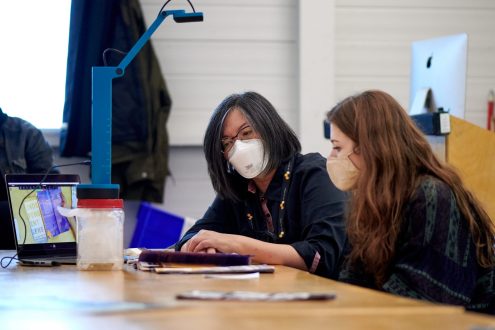Equity, Diversity, Inclusion and accessibility
Equity, Diversity, Inclusion and Accessibility
Equity, diversity, inclusion and accessibility (EDIA) are fundamental values that—when incorporated throughout the institution’s ethos, culture, initiatives and processes—foster a research, learning and working community where everyone feels valued and respected. When EDIA is prioritized, it can lead to far-reaching changes that, in many instances, have been long overdue. NSCAD’s EDIA Targeted Action Plan (TAP) will be used as a guide to ensure EDIA is prioritized throughout all of NSCAD University and the work that we do.
TO DIVERSITY
ACCESSIBILITY FRAMEWORK
NSCAD University’s Accessibility Framework 2022-27 is a multi-year plan developed in collaboration with different sectors within the NSCAD community. The plan describes the actions NSCAD will take to make its environment accessible so that everyone can enjoy free and unhindered access to all activities offered on campus.

Improving Our Practices
EDIA Workshop Resources (March 30, 2023)
The workshop focused on evaluation and application of EDIA best practices. What happens when EDIA becomes too conceptual? How do you apply EDIA in your daily practice? Topics included: sexual orientation and gender identity, policy, leadership and EDIA evaluation of organizations and institutional leadership (in the classroom or the boardroom).
- Land acknowledgement guidelines
- Identifying biases and assumptions
- 2SLGBTQIA+ word bank
- Self-reflection exercises
- Strategies for inclusive classrooms
- Global Diversity, Equity & Inclusion Benchmarks assessment checklists
EDIA Workshop Resources (February 1 and May 6, 2022)
- Privilege Checklist
- Intersectionality 101 by Olena Hankivsky, PhD
- Social Justice: Understanding Race and Privilege by James Baldwin
- Recommended Media Resources
- Micropedia: Learning about microagressions and their sources
- Cultural Diversity in the Media Arts Toolkit
- Inclusive Post-Secondary Education in Canada and the United States
- Being Anti-Racist
Census
NSCAD will demonstrate its commitment to social justice and the removal of barriers to participation throughout our programs, services, and employment environment by executing specific actions to success, such as a community-wide census. An annual census will allow us to ensure that we have a baseline for understanding who is at NSCAD and for measuring the effectiveness of our Targeted Action Plan deliverables.
Census summary report of the data and FAQs
NSCAD Plans and Reports
Canada Research Chair
The Canada Research Chairs Program (CRCP) is committed to achieving a more equitable, diverse and inclusive Canadian research enterprise. NSCAD University, as a participating institution, must make concerted efforts to meet the CRCP’s EDI targets, and provide a supportive and inclusive workplace.
NSCAD currently has one Canada Research Chair – Dr. Leah Decter, Tier 2 Canada Research Chair in Creative Technologies and Community Engagement. Two additional Tier 2 Chairs are currently being recruited:
Canada Research Chair (tier-2) – Art Education Belonging and Social Change
Canada Research Chair (tier-2) – Transatlantic Black Diasporic Art and Community Engagement
For resources, important links and more information on NSCAD’s Canada Research Chairs, click here.
President's Advisory Council
On Anti-Racist Initiatives
In June 2020, NSCAD committed to establishing a multi-stakeholder task force that would advise the president on the development of an anti-racist action plan for the university. The task force, known as the President’s Advisory Council on Anti-Racist Initiatives (PADCARI), will continue as an integral part of NSCAD’s strategic plan to 2030.
